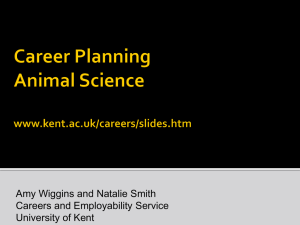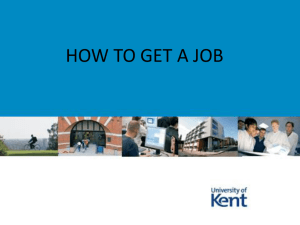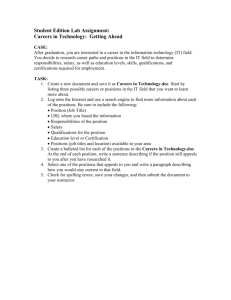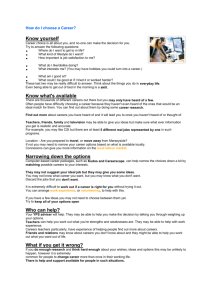Location of the Careers Centre
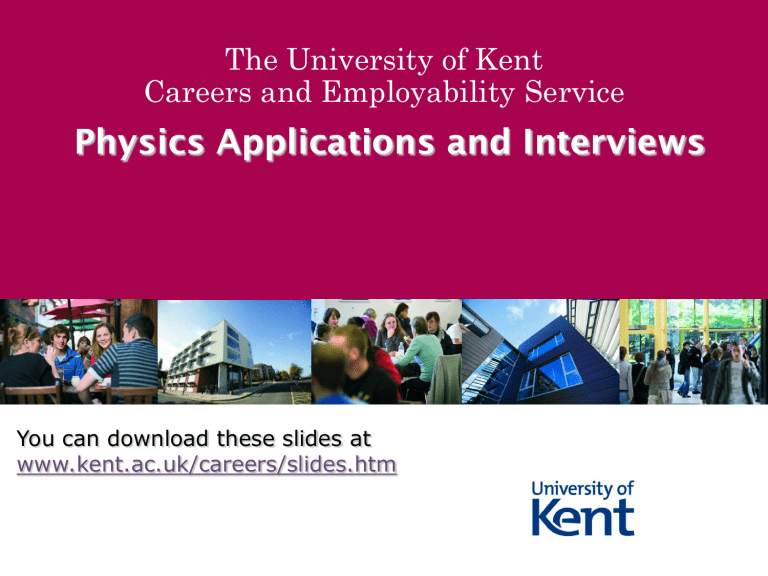
The University of Kent
Careers and Employability Service
Physics Applications and Interviews
You can download these slides at www.kent.ac.uk/careers/slides.htm
“Sell” your degree
• List relevant modules (plus marks if good!)
• Projects – especially if relevant
• Laboratory skills/IT skills
• Soft skills – evidence of teamwork, project management, problem solving etc.
• For non-science jobs (e.g. banking) you would need a different CV focusing on your soft skills more than technical skills .
Example Physics CV
www.kent.ac.uk/careers/cv/physics-cv.htm
THE COVERING LETTER
First Paragraph
– State the job you’re applying for.
– Where you found out about it.
– When you're available to start work (& end if it's a placement)
Third Paragraph
– Summarise your strengths and how they might be an advantage to the organisation.
Second Paragraph
– Relate your skills to the job.
– Why your interested in that type of work
– Why the company attracts you (if it's a small company say you prefer to work for a small friendly organisation!)
Last Paragraph
–
–
Mention any dates that you won't be available for interview
Thank the employer and say you look forward to hearing from them soon.
Competency Questions
The hardest part of the form for most applicants - asking for examples of specific skills such as teamwork, leadership, problem solving e.g.
• Describe how your personal planning and organisation resulted in the successful achievement of a personal or group task.
• Give an example of where others have disagreed with your views. How did you deal with this?
• http://prezi.com/0yaknjsspdh/making-applications-usingthe-star-approach/
The STAR Approach
Situation Whilst employed at Weaver Bros. last summer
• Task I was given the task of rationalising the stock control system
• Action I would look at factors such as when the stock was last ordered, what it was used for and how often it was used. I worked out a method of streamlining the paperwork involved in this process and redesigned the relevant forms, which I then submitted to my manager.
• Result My ideas were accepted and implemented and a
15% reduction in stock levels was achieved“ www.kent.ac.uk/careers/compet/skillquest.htm
PREPARE ANSWERS TO OBVIOUS
QUESTIONS
• Why are you applying to us?
• Why have you chosen science?
• What makes you suitable for this job?
• What other jobs are you applying for?
• Why did you choose your degree course?
• What have you got out of University?
• What do you do in your spare time? What do you get out of it?
PHYSICS QUESTIONS
• How did your physics background help with this application for an engineering role?
• Gave tests: fault finding, mechanical pulleys and levers, spatial ability - "spot the difference"
• How to calculate an orbit at a given altitude
• Radiation effects on spacecraft and how to overcome these?
• Which orbits were best for different types of satellite?
• What instruments were found on satellites? How did these work?
What were they used for?
• Questions about wave guides and electromagnetic propagation down the wave guides.
• Questions of topics related to my degree: space environment
(radiation, heat, magnetic fields), space power (solar cells), space craft orbits (how to calculate orbit time given altitude), solar wind, interactions of charged particles, Van Allen belts.
Electromagnetism, general properties of plasma
• Revise your project and relevant topics covered in your degree.
Technical Questions
• Sometimes a funnelling technique is used, where the questions start at a simple and broad level and then gradually become more specific and detailed perhaps until they reach the point where you cannot answer any further! For example:
• What is the structure and function of an antibody?
• How do you make antibodies?
• What are the disadvantages of an animal-originating antibody?
• How can these be overcome?
(Biochemistry student applying for patent attorney position)
CAREERS WEB SITE
• Applications and Interviews (includes aptitude tests) www.kent.ac.uk/careers/applicn.htm
• Practice Science Interview www.kent.ac.uk/careers/interviews/ivscience.htm
• Employer numerical and verbal aptitude tests www.kent.ac.uk/careers/psychotests.htm
Assessment Centres
• Assessment Centres www.kent.ac.uk/careers/applicn.htm#Selection
• Coping with group exercises www.kent.ac.uk/careers/sk/teamwork.htm
• Presentation skills www.kent.ac.uk/careers/presentationskills.htm
Streamed videos
• On-line Applications
• Interviews
• Telephone interviews
• Assessment Centres www.kent.ac.uk/careers/IntVid.htm
Physics Careers page www.kent.ac.uk/careers/physics.htm
BRUCE WOODCOCK
• A careers adviser is on duty for short (15 minute) consultations in the Careers and
Employability Service any weekday morning 10.30-12.30 or afternoon from
2 pm to 4 pm. You don't need an appointment to see the duty adviser at these times. Just ask at Careers
Reception to see them.
• Email:
bw@kent.ac.uk
Moodle Science Careers Employability Award
www.kent.ac.uk/careers/moodle.htm
The University of Kent
Careers and Employability Service
You can download these slides at www.kent.ac.uk/careers/slides.htm
Telephone Interviews
• Increasingly common: save time and money for both you and employer
• Typically last about half an hour – a bit less than face to face interviews
• Often sifting interviews: just looking for basic fit at this stage. Can he/she communicate effectively? Have they done some research?
• No eye contact , so can say “Would you like me to continue”
• Can refer to notes/CV , even do the interview in your pyjamas!
• Also Skype and robotic interviews
• www.kent.ac.uk/careers/ivphone.htm
EMPLOYER APTITUDE TESTS
Numerical Examples
Which is the missing number in the sequence?
2 ? 8 16
A. 3 B. 4 C. 5 D. 6 E. 7
? 14 12 11 11
A. 13 B. 15 C. 16 D. 17 E. 28
ANSWERS Q1. 4 Q2. 17
Employer Aptitude tests
• Normally done on line along with your application
• Work quickly – not difficult but a lot of questions in a short time
• Business maths – graphs, tables, rations, percentages rather than geometry and calculus!
• Practice makes perfect!
www.kent.ac.uk/careers/psychotests.htm
VERBAL REASONING
Cardiovascular disease is so prevalent that virtually all businesses are likely to have employees who suffer from, or may develop, this condition. Research shows that between 50-80% of all people who suffer a heart attack are able to return to work. However, this may not be possible if they have previously been involved in heavy physical work. In such cases, it may be possible to move the employee to lighter duties, with appropriate retraining where necessary. Similarly, high-pressure, stressful work, even where it does not involve physical activity, should also be avoided. Human
Resources managers should be aware of the implications of job roles for employees with a cardiac condition.
A) The majority of people who have suffered a heart attack can later return to work.
B) Heart disease can affect people of any age.
ANSWER TRUE, FALSE or CANNOT SAY
A) TRUE B) CANNOT SAY
Bioscience Interview Questions
• What is the polymerase chain reaction?
• What do HIV, IgG, PEG2 stand for?
• What structure does NH2-CH2-COOH belong to?
• Suggest a route to synthesise ethylene glycol
• Technical questions about electron microscopes, ice cores, ice conductivity.
• About my final year project (synthesis of dendrivers)
• Revise your project and relevant topics covered in your degree.
Application Process
The smaller company process is much simpler and you can apply
much later (often after final exams) but salaries are usually lower and they offer less training and less chance to specialise.
Research by forum3 found:
• The average graduate will send out 70 CVs when looking for their first graduate job. The average number of responses is 7 including 4 rejections and the remainder inviting the graduate to interview or further contact.
• The more CVs you send out the more interviews you get.
• Applicants who included a covering letter with their CV were
10% more likely to get a reply.
• Applicants sending CVs and letters without spelling mistakes are 61% more likely to get a reply and 26% more likely to get an interview. The most common mistakes not found in a spell check were: fro instead of for, grate: great, liased: liaised, stationary: stationery.
• Other turn-offs : misspelling the name of the company or the addressee, not having a reply address on the CV and trying to be amusing.
SCIENCE INTERVIEWS
• Interview may be “on the hoof”
• Technical questions: often on your project
– revise it carefully
How not to do it ….
– I enclose a tea-bag so you can enjoy a cuppa while perusing my form
– Working on a farm has improved my communication skills which are especially important when working with large livestock.
– Applying for job at biscuit company: my life-long love of chocolate biscuits, is the main reason for my interest in the company
– It's best for employers that I not work with people
– On an application for a position requiring considerable people skills - My hobbies include watching television, computer chess, stamp collecting and walking my 2 spaniels.
– Reason for leaving last job: my employers insisted that all employees get to work by 9 am and I could not work under those conditions.
– I am seeking challenges that test my mind and body, since the two are usually inseparable.
– I have an excellent track record, although I am not a horse.
SPATIAL OR DIAGRAMMATIC REASONING
Which is the next shape in the sequence: a, b, c, d or e?
1. d 2. b
Why you need to use a spell checker
• I am a prefectionist and rarely if if ever forget details.
• Proven ability to track down and correct erors.
• I have good writen comunication skills.
• Lurnt Word Perfect computor and spreadsheet pogroms.
• Develop an annual operating expense fudget…
And why you must read it carefully as well
• Extra Circular Activities
• At secondary school I was a prefix
• In my spare time I enjoy hiding my horse
• I hope to hear from you shorty
• I am a conscious individual.
• Reason for leaving last job: maturity leave
• I have a desire to work with commuters
• Dear Madman (instead of Madam)
• I am sicking and entry-level position
Skills gained on a science
Degree
• Gather and analyse relevant information from a wide variety of sources
• Identify and propose solutions to problems
• Project management
• Technical skills
• Work independently (individual projects)
• Communicate with others in a clear and articulate manner
• Present ideas and arguments verbally in presentations, seminars, and discussions
• Sell these on your CV and applications
EMAILING CVS
Many employers are happy to accept CVs as an attachment to an email.
– Put your covering letter as the body of your email.
Format it as plain text (use the format heading on
Outlook Express to do this), so it can be read by any email reader.
– Your CV is then sent as an attachment.
Say you'll send a printed CV if required.
– Email it back to yourself first to check it.
Competency Questions
Answers could come from
vacation or part-time work;
university societies;
voluntary work;
study at school or university – especially projects;
holidays and travel or personal and family experiences. Planning and organising a week’s independent travel in Scotland is as valid an example as a trek through the Himalayas.
The STAR Approach
• Answer these questions via the STAR approach S ituation, T ask, A ction and R esult.
• Like a mini essay: The Situation and Task are usually combined and form the introduction
• The Action you took, should form the main part of your answer
• The Result should be your conclusion
